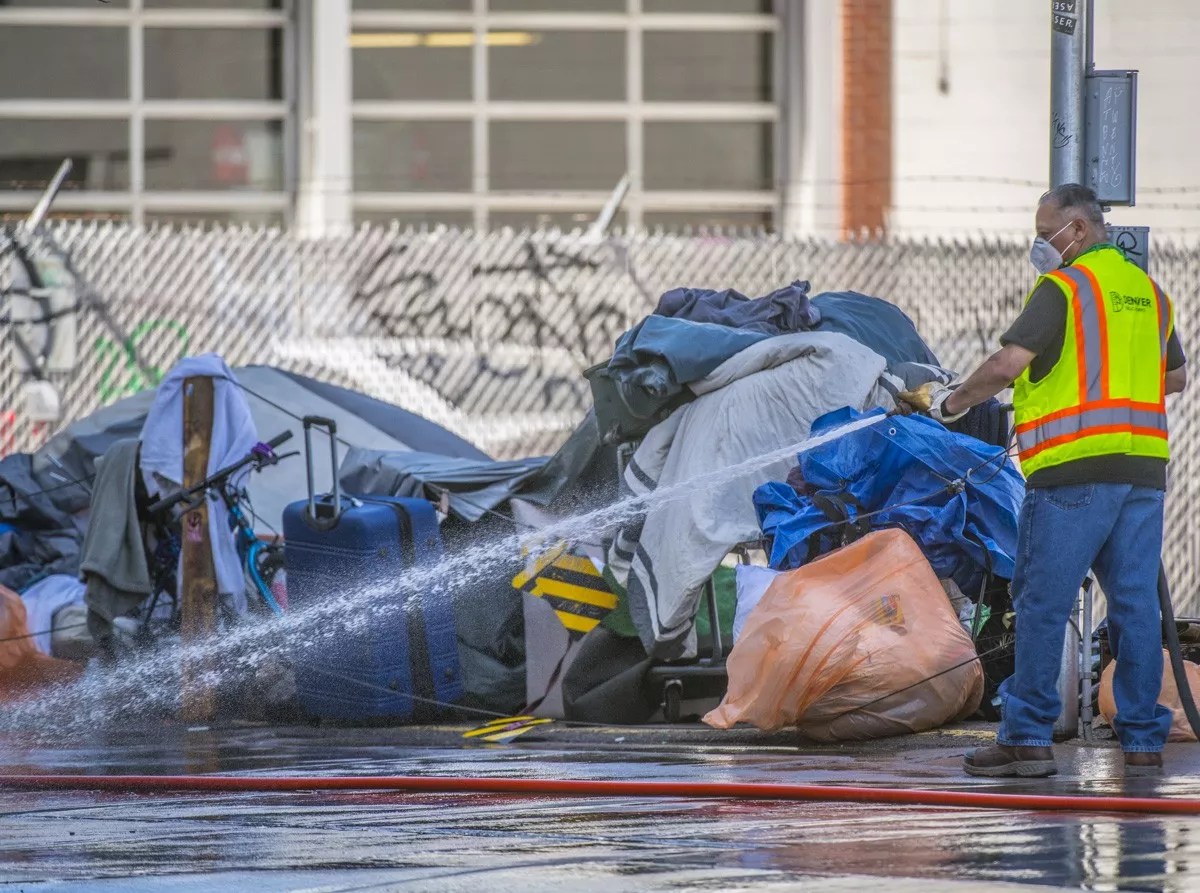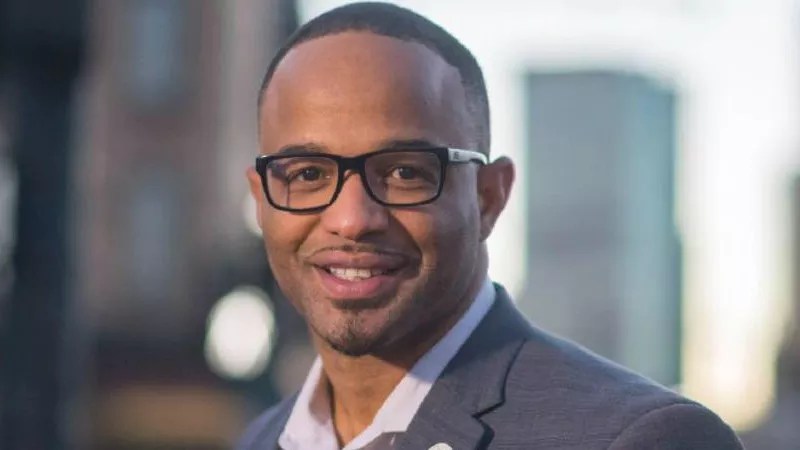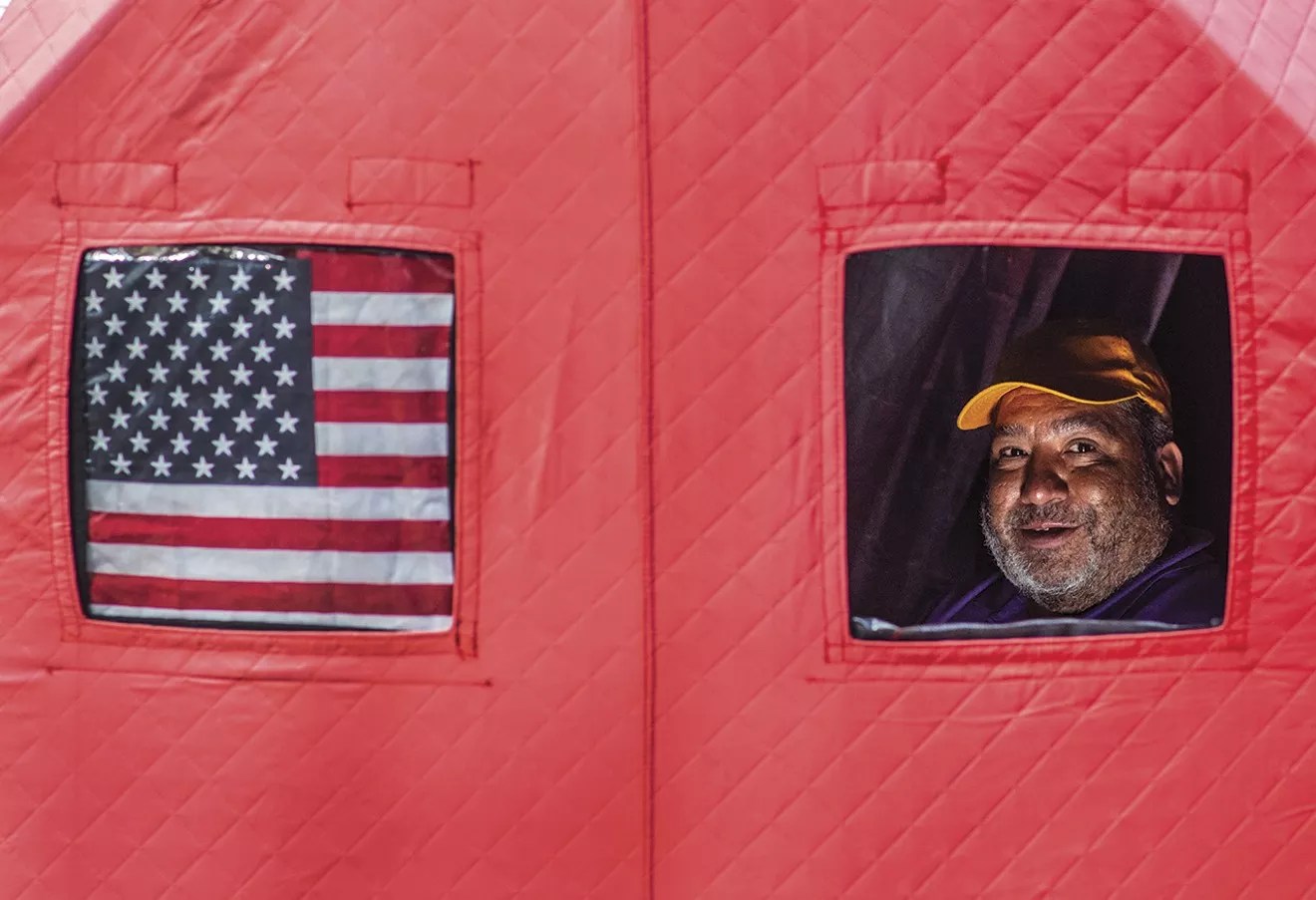
Evan Semón

Audio By Carbonatix
On May 14, Denver will mark the ten-year anniversary of Denver City Council approving the unauthorized camping ordinance.
Mayor Michael Hancock signed the camping ban into law on May 17, 2012, and the controversial measure has been an integral part of his administration’s approach to homelessness. Hancock’s time in office will end next year when his third term is up, but while he’s been mayor, officers with the Denver Police Department have conducted 17,050 street checks for unauthorized camping, contacted 27,425 people during those checks, issued 413 written warnings, penned 45 citations and arrested three people for unauthorized camping.
The anniversary of the controversial law hasn’t gone unnoticed by homeless-rights advocacy groups, including Occupy Denver, Mutual Aid Monday and Housekeys Action Network Denver, which are organizing a week of protests and other activities in the run-up to May 14.
“It’s a decade. We should be ashamed of ourselves,” says Brian Loma with Occupy Denver. “They’re wasting millions and millions of dollars.”
The week of action will include an array of events focusing on what organizers are calling “Denver’s Decade of Doom.” On Monday, May 9, for example, activists will rally outside the Denver City and County Building to hand out food and clothing before heading inside city council chambers to testify during public comment at 5 p.m. And then on Saturday, May 14, there will be a rally in front of the City and County Building, with a performance by Los Mocochetes before a march to the offices of the Downtown Denver Partnership, an early advocate of the ban.
How did Denver get to this point? Here are ten key events leading to the passage of the ordinance and the subsequent “Decade of Doom.”

John Hickenlooper created Denver’s Road Home.
Michael Roberts
Hickenlooper Promises to “End Homelessness”
When they each served as mayor, both Federico Peña and Wellington Webb attempted to tackle various aspects of homelessness. Peña’s work in the 1980s led to the formation of the Colorado Coalition for the Homeless, which remains a prominent Denver nonprofit. In the ’90s, Webb leased a city building to the Coalition and set up another fifteen units for youth experiencing homelessness.
But their efforts weren’t enough to stop the growing spread of unhoused people living in Denver. “The Webb administration, we often said, they just didn’t use the word ‘homelessness,'” recalls Lindi Sinton, vice president of program operations for Volunteers of America Colorado, who’s been with that nonprofit organization for over four decades.
The 2003 mayor’s race moved homelessness to the top of the list of challenges facing the city, however. And John Hickenlooper, who had already impressed service providers with his desire to tackle homelessness, won the race.
Hickenlooper had first become interested in the issue in 1988, when he and some business partners were working to open the Wynkoop Brewing Company in a run-down part of LoDo. After they found two “bums” – a word that Hickenlooper recognizes now is not “politically correct” – sleeping in the Wynkoop’s vestibule, he and his partners hired the men to help renovate the building.
“It seemed like there needed to be a solution. These guys wanted to work. We genuinely liked them,” recalls Hickenlooper, who left the mayor’s office in his second term to become governor and is now a U.S. senator.
In 2005, the Hickenlooper administration introduced Denver’s Ten Year Plan to End Homelessness. It was the city’s answer to a challenge put forth by the U.S. Interagency Council on Homelessness, which asked mayors around the country to develop strategies to end homelessness in their cities within ten years. The mayor also created Denver’s Road Home, a team housed within the Department of Human Services that would focus on homelessness.
Denver’s Road Home was never able to bring Denver home on the issue, however, and Hickenlooper now calls the ten-year tag “aspirational.” However, Denver’s Road Home did spark successful public-private partnerships and also brought together service providers. And while the city spent relatively little on the program – $72.3 million in public and private dollars over the decade that the plan was in place – it made progress on a handful of important problems it had set out to fix, including chronic homelessness, which dropped significantly while Hickenlooper was in office.
Then came the Great Recession, which chipped away at some of those gains.
Sit-Lie Ordinance
Even as the city was embarking on Denver’s Road Home, a new law approved in 2005 laid much of the groundwork for the camping ban – without creating nearly as much controversy.
In 2005, Denver City Council, looking at laws on the books in other cities across the country, passed an ordinance that banned anyone from sitting or lying on sidewalks or other public rights-of-way in the downtown business district from 7 a.m. to 9 p.m. At the same time, council also tinkered with existing ordinances to ban panhandling on roadways and solicitation of money within twenty feet of tables at outside dining areas.
Debbie Ortega was working at Denver Human Services at the time as the director of the city’s approach to homelessness. She says that the city made sure that the passage of that ordinance was paired with growing services for people that law enforcement would contact on the streets. “We looked at how many shelter beds we had and what the need was,” Ortega recalls.
The ordinance had its doubters, though.
“Most of all, these will make it illegal for someone to say, ‘Brother, can you spare a dime,'” Robert Espinoza, a homeless advocate, warned during the December 2005 council hearing on the proposal, according to the Denver Post. But council passed the ordinance, and Hickenlooper then signed the legislation into law. It remains on the books today.

Not long after Occupy Denver emerged, the city enacted a camping ban.
Westword
Occupy Denver
Following in the footsteps of demonstrators in Manhattan, activists set up encampments in highly visible areas of Denver in 2011, protesting Wall Street greed and government mismanagement. Members of Occupy Denver sometimes clashed with police officers, who engaged in several major sweeps, including one at Lincoln Veterans Memorial Park by the State Capitol.
The proliferation of encampments associated with Occupy Denver, as well as the tents around town that people were using as shelter, provided talking points for Denver business leaders and policymakers who were beginning to consider a campaign ban.
Occupy Denver would soon become one of the primary opponents of that proposal.

As councilman, Albus Brooks introduced the camping ban ordinance.
Evan Semón Photography via Albus Brooks
Camping Ban
With encampments becoming more visible in Denver, Councilman Albus Brooks, whose district included downtown, officially proposed the unauthorized camping ordinance in early 2012. Brooks was less than a year into his tenure on Denver City Council, and was still building connections with the movers and shakers of Denver – many of whom encouraged him to go forward with a camping ban proposal.
One option was to simply expand the sit-lie ordinance to other areas of the city. But Brooks says he felt that would just kick the problem into other parts of Denver. At the time, other cities across the United States were enacting camping bans, and Brooks decided to follow their model, referring to the Denver situation as an “emergency,” since “people fear for their sanity, their safety, and the streets are not clean.”
Meeting with community members, Brooks described visiting the 16th Street Mall at midnight with his wife and counting 178 people who were sleeping there.
“The way we wanted to structure it,” he recalls, “was kind of a light touch but to send a message that, ‘Hey, you can’t sleep or set up structures outside, but we will do everything to ensure that there’s shelter, there’s emergency shelter, there’s temporary shelter, and there’s housing.'”
Rather than work with homeless-service providers to craft the proposal, Brooks decided to simply have them respond to the finished product. And they did, with a vengeance. The proposal drew strong opposition not only from Occupy Denver, but also the ACLU of Colorado and, especially, the Colorado Coalition for the Homeless.
“It would force those without shelter further into our neighborhoods and further out of sight,” John Parvensky, the longtime president of the Colorado Coalition for the Homeless, wrote in an op-ed published in the Denver Post in April 2012. “This would make outreach and engagement even more difficult. It would also negatively impact the quality of life in our neighborhoods as people without shelter would be hiding in alleys, dumpsters and cars throughout the city.”
The next month, Denver City Council voted 9-4 to approve the camping ban, which criminalized camping in tents or using sleeping bags to shelter on public property in Denver. The council hearing for the final vote was especially heated, with opponents of the ban shouting “Shame!” at those who voted in support of the measure.
Hancock promptly signed the ordinance into law.
Brooks, who lost his 2019 re-election bid to Candi CdeBaca, says he doesn’t regret pushing the ban, despite the flak that he’s taken from activists and other members of the public over the ordinance since then. But the former councilman does wish that he had collaborated more with service providers in crafting the law.
“Honestly, in the conversations I had with providers, we weren’t far off in disagreement,” he recalls. “Providers were seeing that people were not taking advantage of the services. They wanted the same thing. I think what they struggle with was the speed with how it passed and that the proponents were predominantly business leaders who were outspoken.”
Today a vice president with the Milender White construction company, Brooks points out that he’s now building housing and walking the walk.
Over the past decade, camping bans have become even more common in cities across America. But many policymakers recognize that such laws don’t do much to solve the issue of homelessness.
Back in 2012, Ortega, who’d been elected the year before to an at-large seat on Denver City Council, was one of the “no” votes on the camping ban proposal; she was concerned that the ordinance wasn’t paired with providing services.
“Ironically, we have more people living out on the streets than at the time it passed,” she says. “What we’re doing right now is basically moving people from one location to another.”
She’s talking about the sweeps that the camping ban helped make possible.

Terese Howard helped push Denver Homeless Out Loud to the forefront.
Noah Kaplan
Formation of Denver Homeless Out Loud
Just a few months after the passage of the camping ban, homeless-rights advocates in Denver, including some people experiencing homelessness, came together to form Denver Homeless Out Loud. In the years since, DHOL has been the primary organization pushing for the City of Denver to treat homeless residents with more dignity. Prominent activists associated with DHOL include Terese Howard and Jerry Burton, the latter of whom created a famous tent encampment called Jerr-E-Ville and has fought tooth and nail against the city’s camping ban.
While groups like the Colorado Coalition for the Homeless often adopt a more diplomatic tone when discussing the city’s handling of homelessness, DHOL rips the Hancock administration just about anytime it comments on Denver’s homelessness response. And DHOL representatives attend almost every homeless encampment sweep, which typically happen a few times a week, to hold law enforcement officers and public officials to account.
“Everything that Denver is doing right now was shoved down their throat, except for the traumatic displacements,” says Occupy Denver’s Loma, who often organizes with DHOL, pointing out that projects like tiny home villages came about only after pressure was put on the Hancock administration. “That stuff was forced on the city because of activists who were fighting this law that made their lives illegal.”
Initiative 300 Fails
Denver Homeless Out Loud and other homeless advocacy groups successfully pushed to put the Right to Survive measure on the May 2019 municipal ballot. The proposal, which was intended to codify into law that people in Denver had the right to rest, to shelter, and to distribute and accept food in public spaces, would have also overturned the camping ban.
Supporters of the Right to Survive – which became Initiative 300 on the ballot – contributed $106,363 to the campaign. Opponents poured $2,446,550 – more than twenty times that much – into Together Denver, which led the campaign opposing I-300. The Downtown Denver Partnership, the National Association of Realtors and Visit Denver were some of the top donors to Together Denver, which used the campaign line “We Can Do Better.” Voters were persuaded, and 81.19 percent of them said no to I-300.
Creation of Department of Housing Stability
With I-300 stirring up discussion of how the city had been handling homelessness, Hancock announced in April 2019, a month before the election, that his administration would be forming a new department: the Department of Housing Stability, or HOST, which would focus on housing and homelessness and also have a full departmental budget.
Hancock won the election in a runoff against Jamie Giellis, and HOST went live in October 2019, with Britta Fisher leading the department. HOST has won positive reviews from service providers, who largely express admiration for Fisher’s leadership and an appreciation for the efficiencies and collaboration now possible with the City of Denver’s response to homelessness and housing under one roof. Denver has also introduced the Support Team Assisted Response (STAR) truck, which is staffed by a paramedic and a mental health clinician who respond to crisis situations that don’t merit a law enforcement response.

The city has increased its spending on safe-camping sites.
Evan Semón
Approval of Safe-Camping Sites
After the implementation of the camping ban in 2012, the city began increasing homeless encampment sweeps, and criticism of the Hancock administration’s reliance on this approach also increased. The city didn’t just use the camping ban to justify these actions; it also looked to public-right-of-way ordinances, among other laws.
But when the pandemic locked down Denver in March 2020, the city eased up on sweeps, heeding the advice of the Centers for Disease Control and Prevention, which was telling municipalities not to clear out encampments unless individual housing units were available for their residents.
During the early months of the pandemic, service providers pitched a new idea to the Hancock administration: Establish sanctioned camping sites with centralized access to sanitation facilities and services as a way to reduce harm and disease spread during the pandemic. Such sites would offer a safer alternative to living on the streets for people who were averse to going into shelters. But in April 2020, Hancock balked at the idea, saying he was opposed to it. At the same time, the city also restarted encampment sweeps.
Within a few months, however, Hancock changed his mind, and by July he endorsed the concept. The first sites went live in December 2020; the Hancock administration earmarked about $4 million in the 2022 budget for safe-camping sites.
Since their introduction in Denver, safe-camping sites have sheltered hundreds of people experiencing homelessness; some residents have even gone on to secure permanent housing with the help of caseworkers. But the safe-camping site program still only serves a fraction of the unsheltered homeless population, with the rest living in tents on the streets, hidden in sleeping bags in parks, or camping out next to rivers. And all of those people not living in sanctioned settings are still subject to encampment sweeps.
Federal Court Injunction
In October 2020, ten homeless individuals and Denver Homeless Out Loud sued the City of Denver in the U.S. District Court of Colorado, alleging that the city had engaged in unconstitutional practices during encampment sweeps. Much of the lawsuit was focused on particularly high-profile sweeps, including the July 2020 sweep of a huge encampment in Lincoln Veterans Memorial Park across from the Capitol.
Andy McNulty, a Killmer, Lane & Newman attorney, represented the plaintiffs and dueled with the City of Denver and its attorneys in federal court. And McNulty was able to secure a victory: In January 2021, Judge William J. Martinez issued an injunction requiring the city to provide at least seven days’ notice before conducting sweeps in non-exigent contexts. And even in exigent situations, when there are “evidence-based reasons to believe that a public health or safety risk exists which requires the undertaking of such encampment sweeps with less than seven days’ advance notice to the residents of those encampments,” the city must provide at least 48 hours’ written notice before sweeping an encampment, Martinez ruled.
The court order remains in place while the City of Denver’s appeal of the judge’s decision is in the 10th U.S. Circuit Court of Appeals.
The 2023 Municipal Election
With Denver’s next municipal election less than a year away, candidates for mayor and city council are already polishing their platforms. And homelessness – especially how to deal with homeless encampments – will be a heated point of discussion.
“Whoever is running for council or mayor or anything, this is going to be the issue,” Brooks says. “If people do not have a visionary, decisive way to make sure people have housing and our streets are safe and clean, they’re going to have a hard time winning in this city.”
Ortega, who is term-limited, also believes that homelessness and how to deal with encampments will be hot topics over the next year. “I think it’s going to be a part of whether conventions are going to keep wanting to come to Denver when we have the challenges downtown,” she says.
Loma is hopeful that the week of action in the lead-up to the ten-year anniversary of the camping ban will help Denver residents “learn what the issue is, what’s going on, why it’s not solved, what we’re doing right, what we’re doing wrong,” he says. “As we’re headed toward a new election, we need to have these discussions.”
Find more information here about the week of action in the run-up to the anniversary of the Denver City Council vote on the camping ban.